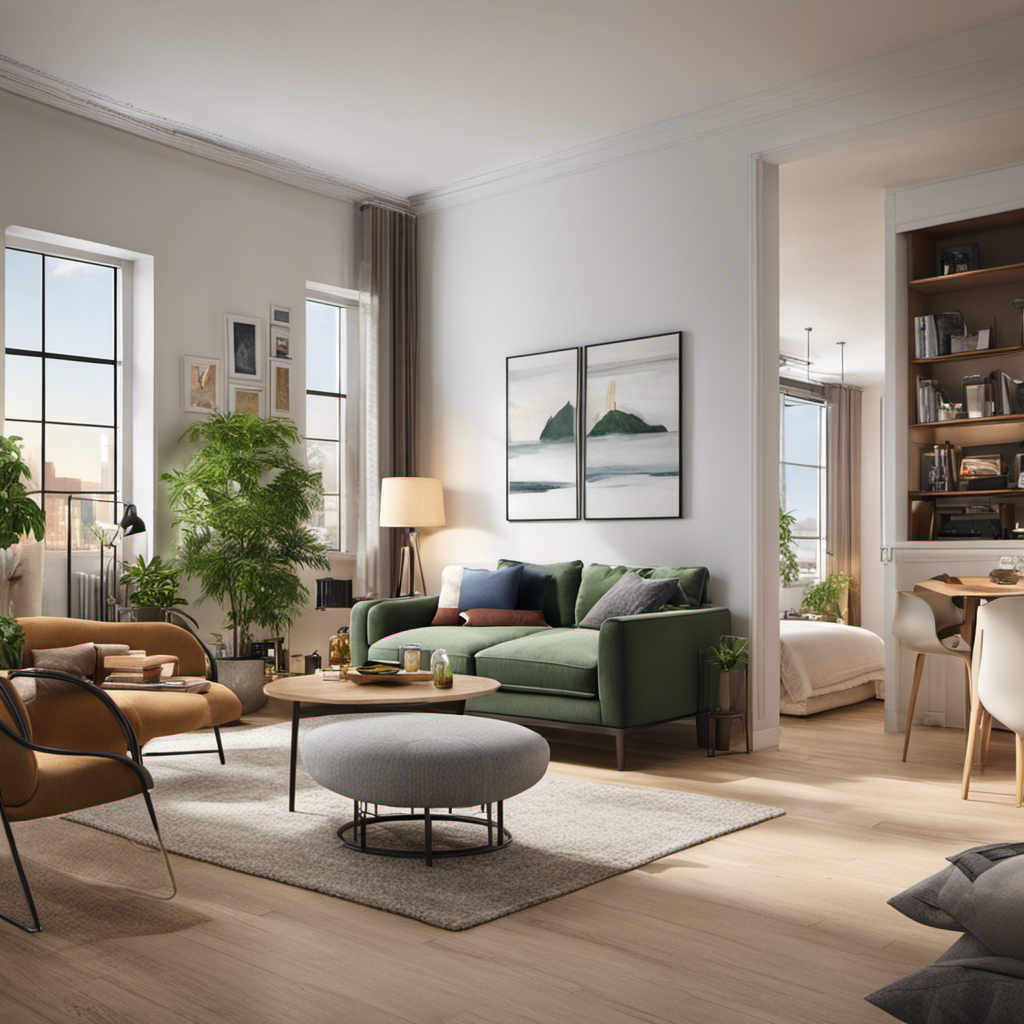In this article, we will explore the four essential purposes of the HVAC system. As a professional in the field, it is crucial to understand how this system serves others.
By ensuring energy efficiency, controlling temperatures, maintaining indoor air quality, and regulating humidity, the HVAC system plays a vital role in providing comfort and a healthy environment.
Additionally, we will touch upon the importance of ventilation and system maintenance to ensure optimal performance and customer satisfaction.
Key Takeaways
- Energy Efficiency and Cost Reduction: HVAC systems allow for optimization of energy consumption and cost reduction through high-efficiency equipment, proper insulation, smart controls, and thermostats.
- Temperature Control and Comfort: HVAC systems regulate and maintain the desired temperature in a space, creating a pleasant atmosphere for living or working.
- Indoor Air Quality and Health: HVAC systems incorporate air purification mechanisms, such as filters and UV germicidal irradiation, to ensure clean and pollutant-free air for a comfortable environment and occupants’ health and well-being.
- Humidity Regulation and Indoor Environment: HVAC systems manage and balance moisture levels to prevent discomfort, mold growth, dryness, and skin irritation through dehumidification and humidification techniques.
Energy Efficiency
Energy efficiency is a crucial aspect of HVAC systems as it allows individuals to optimize energy consumption and reduce costs. By focusing on energy savings, HVAC systems can help homeowners and businesses lower their utility bills while also minimizing their environmental impact.
Energy-efficient HVAC systems are designed to provide the same level of comfort and functionality while using less energy. This can be achieved through various means, such as using high-efficiency equipment, properly insulating the building, and implementing smart controls and thermostats.
Temperature Control
To achieve optimal comfort levels, HVAC systems employ various mechanisms to regulate and maintain the desired temperature within a given space. Temperature regulation is a critical aspect of HVAC systems, as it ensures that the environment remains comfortable and conducive for occupants.
This is achieved through the use of thermostat control, which allows users to set and adjust the temperature according to their preferences. The thermostat acts as a control device that monitors the temperature and activates the heating or cooling system when necessary. It ensures that the temperature remains consistent and within the desired range, providing a comfortable and enjoyable living or working environment.
With the help of thermostat control, HVAC systems can effectively maintain the desired temperature and create a pleasant atmosphere for individuals to thrive in.
Indoor Air Quality
Although often overlooked, indoor air quality is a crucial aspect of HVAC systems that greatly impacts the health and well-being of occupants. Ensuring clean and pollutant-free air is essential for creating a comfortable and healthy environment.
HVAC systems play a vital role in maintaining indoor air quality by incorporating air purification and pollutant removal mechanisms. These systems utilize filters, such as high-efficiency particulate air (HEPA) filters, to capture and remove airborne pollutants, including dust, pollen, pet dander, and mold spores.
Additionally, advanced HVAC systems may also incorporate technologies like UV germicidal irradiation, which helps eliminate bacteria and viruses from the air.
Humidity Regulation
Proper humidity regulation is a critical function of HVAC systems, ensuring optimal comfort and maintaining a healthy indoor environment. Humidity control refers to the ability of HVAC systems to manage and balance the moisture levels in a space. It is important because excessive humidity can lead to discomfort, mold growth, and respiratory issues, while low humidity can cause dryness, skin irritation, and static electricity.
HVAC systems achieve humidity regulation through moisture management techniques such as dehumidification and humidification. Dehumidification involves removing excess moisture from the air, while humidification adds moisture to the air when it is too dry.
Ventilation
Ventilation plays a crucial role in maintaining indoor air quality and ensuring the circulation of fresh air throughout a building. Proper air circulation is essential for the well-being and comfort of occupants, as well as for the removal of pollutants and odors.
HVAC systems use mechanical ventilation to bring in fresh air from the outside and distribute it evenly throughout the building. This is achieved through the use of air ducts and vents strategically placed in different areas.
Fresh air intake is necessary to dilute and remove indoor air pollutants, such as volatile organic compounds (VOCs), allergens, and stale air. By continuously exchanging indoor air with fresh outdoor air, ventilation helps to create a healthier and more comfortable environment for occupants.
System Maintenance
Regular system maintenance is necessary to ensure the optimal performance and longevity of an HVAC system.
Preventive care plays a crucial role in keeping the system running smoothly and efficiently. By regularly inspecting and cleaning the various components of the HVAC system, potential issues can be identified and resolved before they become major problems.
This includes checking and replacing filters, cleaning the coils, and inspecting the ductwork for any leaks or damage.
Additionally, troubleshooting tips can help in identifying and resolving common issues that may arise, such as uneven cooling or heating, strange noises, or poor air quality.
Frequently Asked Questions
How Can I Improve the Energy Efficiency of My HVAC System?
To improve the energy efficiency of your HVAC system, follow these energy-saving tips. Regular HVAC maintenance, such as cleaning or replacing air filters, checking for leaks, and scheduling professional inspections, can help optimize its performance and reduce energy consumption.
What Temperature Range Is Considered Ideal for Indoor Comfort?
The ideal temperature range for indoor comfort is typically between 68-72 degrees Fahrenheit. Factors such as humidity, insulation, and personal preference can influence this range. Maintaining a comfortable indoor temperature is one of the four purposes of the HVAC system.
What Are Some Common Indoor Air Pollutants and How Can They Be Eliminated?
Indoor air pollutants are harmful substances that can affect the health and well-being of occupants. Common pollutants include dust, pollen, mold, and volatile organic compounds. To eliminate them, proper ventilation, air filtration, and regular cleaning are recommended.
How Does Humidity Affect Indoor Comfort and What Can Be Done to Regulate It?
Humidity levels greatly impact indoor comfort. High humidity can cause discomfort, while low humidity can lead to dryness and respiratory issues. To regulate humidity, HVAC systems utilize dehumidifiers and humidifiers to maintain optimal levels for occupants’ well-being.
What Are the Benefits of Proper Ventilation in a Building?
Proper ventilation in a building is essential for several reasons. It helps remove indoor pollutants and odors, improves air quality, reduces the risk of illness, and promotes a comfortable and healthy environment by ensuring a constant supply of fresh air.


